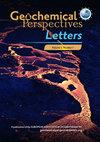砷在蛇纹岩中揭示的俯冲氧化还原动力学
IF 3.7
1区 地球科学
Q1 GEOCHEMISTRY & GEOPHYSICS
引用次数: 0
摘要
由于缺乏直接的地球化学示踪剂,俯冲过程的氧化还原动力学仍然很不受约束。我们利用x射线吸收光谱研究了作为喜马拉雅俯冲的见证的Tso Morari蛇纹岩中砷的化学和氧化还原状态。我们的测量结果显示,从砷化物(As - III)到亚砷酸盐(As III)和砷酸盐(As V),氧化还原形成了显著的对比。结合物理化学约束,这些数据能够重建俯冲过程中砷的“氧化还原旅行”。在地幔橄榄岩的早期蛇纹石化过程中,砷从流体中被清除,并以不溶性砷化镍的形式被拖下。接近变质峰(550 ~ 650℃)的部分沙漠化作用导致砷化物氧化溶解到水中的As III和As V,并被反长岩非特异性地吸收。矿物中分析的As V /As III比率(~ 0.1 - 10)平均比假定整体系统热力学平衡时预测的高~ 104倍。这些发现反映了高氧化流体的短暂非平衡释放,fo2在费亚石-磁铁矿-石英缓冲层(FMQ þ 10)上方达到~ 10个对数单位。因此,蛇纹岩中的砷是俯冲氧化还原动力学的敏感记录,当使用传统的平衡方法应用于大块流体-矿物系统时,这是无法实现的。本文章由计算机程序翻译,如有差异,请以英文原文为准。
Redox dynamics of subduction revealed by arsenic in serpentinite
Redox dynamics of subduction processes remain poorly constrained owing to the lack of direct geochemical tracers. We studied, using X-ray absorption spectroscopy, the chemical and redox state of arsenic in the Tso Morari serpentinites that are witnesses of the Himalayan subduction. Our measurements reveal remarkably contrasting redox speciation, from arsenide (As – III ) to arsenite (As III ) and arsenate (As V ). Combined with physical-chemical constraints, these data enable reconstruction of the ‘ redox travel ’ of arsenic in the subduction process. Upon early serpentinisation of mantle peridotite, arsenic was scavenged from the fluid and dragged down as insoluble nickel arsenide. Partial deserpentinisation close to the peak metamorphism (550 – 650 °C) resulted in oxidative dissolution of arsenide to aqueous As III and As V and their non-specific intake by antigorite. The As V /As III ratios ( ∼ 0.1 – 10) analysed in the mineral are ∼ 10 4 times higher on average than predicted assuming bulk system thermodynamic equilibrium. These findings reflect a transient out-of-equilibrium release of highly oxidised fluids, with f O 2 reaching ∼ 10 log units above the fayalite-magnetite-quartz buffer (FMQ þ 10). Arsenic in serpentinite is thus a sensitive record of subduction redox dynamics inaccessible when using traditional equilibrium approaches applied to bulk fluid-mineral systems.
求助全文
通过发布文献求助,成功后即可免费获取论文全文。
去求助
来源期刊

Geochemical Perspectives Letters
Earth and Planetary Sciences-Geochemistry and Petrology
CiteScore
7.00
自引率
2.00%
发文量
42
审稿时长
15 weeks
期刊介绍:
Geochemical Perspectives Letters is an open access, internationally peer-reviewed journal of the European Association of Geochemistry (EAG) that publishes short, highest-quality articles spanning geochemical sciences. The journal aims at rapid publication of the most novel research in geochemistry with a focus on outstanding quality, international importance, originality, and stimulating new developments across the vast array of geochemical disciplines.
 求助内容:
求助内容: 应助结果提醒方式:
应助结果提醒方式:


